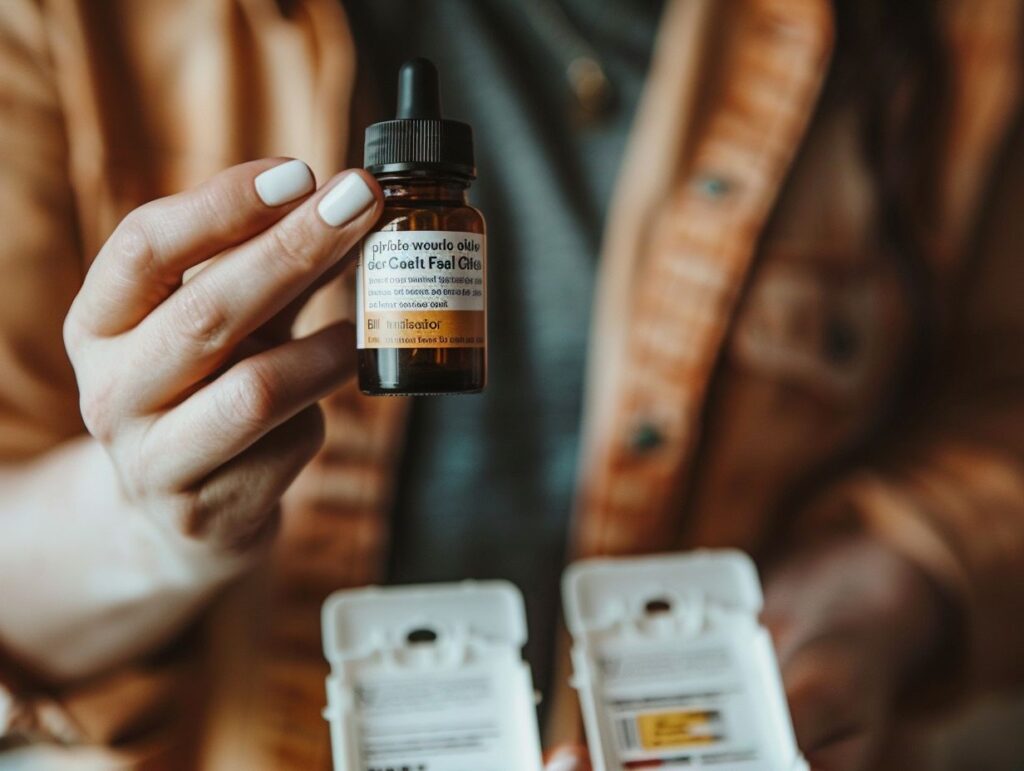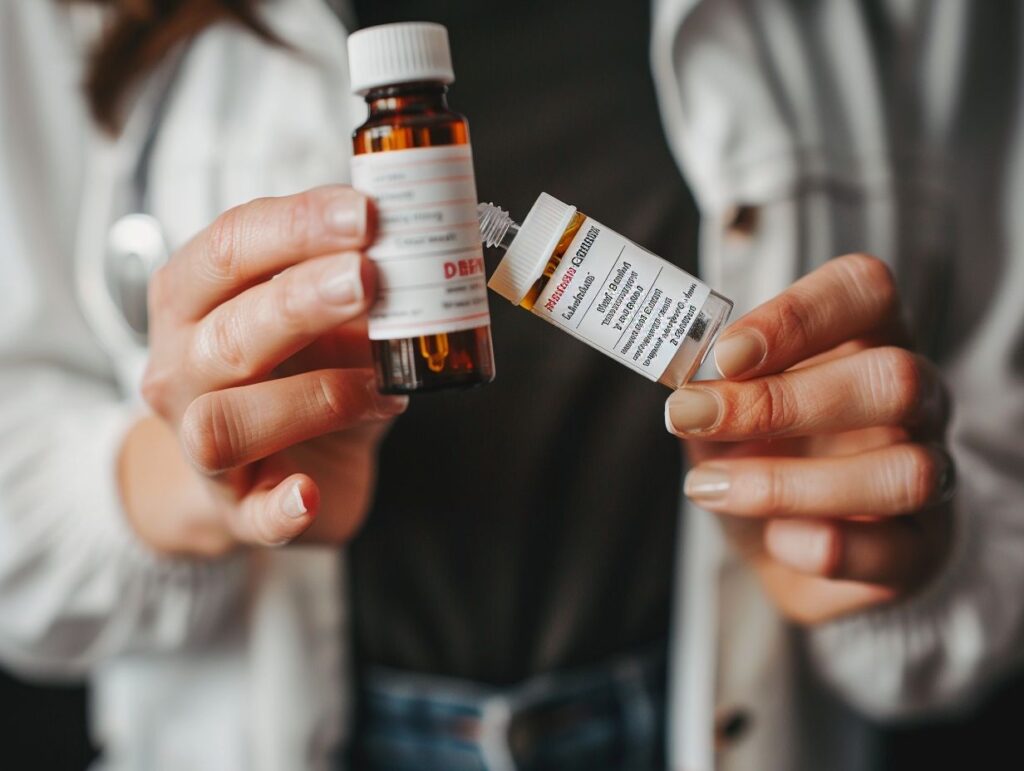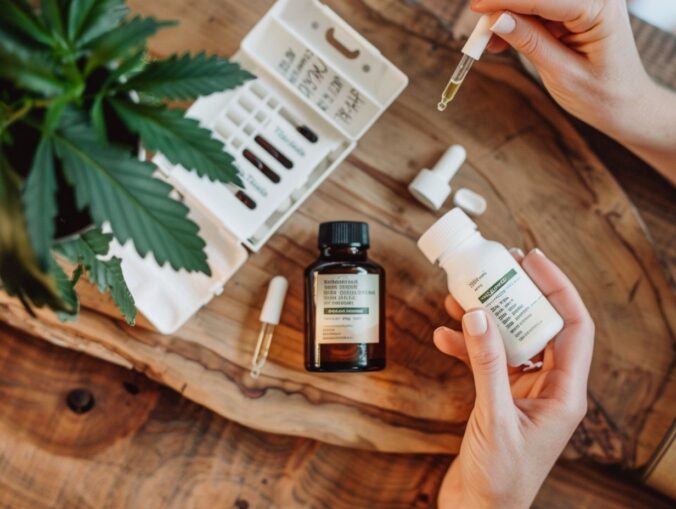With the rising popularity of CBD products, many people are turning to this natural remedy for various health issues.
- Can using CBD result in a positive drug test? In this article, we will explore what CBD is, how it works in the body, the potential benefits of using CBD, and the differences between CBD and THC.
- We will also discuss how long CBD stays in the body and provide tips on how to avoid a positive drug test when using CBD.
- Let’s dive in and learn more about this fascinating compound.
What is CBD?
CBD, short for cannabidiol, is a naturally occurring substance derived from the cannabis plant. It is known for its therapeutic properties and is commonly ingested in various forms like oils, edibles, and topicals. The legality of CBD is subject to regulations that differ across jurisdictions, affecting workplace policies and setting legal limits on its use. Despite this, CBD is increasingly recognized for its potential health benefits, prompting its growing popularity in the wellness industry.
Consumers have the option to consume CBD through oral ingestion, topical application, inhalation, or sublingual administration. The versatility of CBD products allows individuals to choose a method that best suits their preferences and needs. With the gradual acceptance of CBD in mainstream culture, scientific research continues to unveil its potential therapeutic applications ranging from pain management to anxiety relief. This newfound understanding has propelled CBD into the spotlight, driving an industry surge in products ranging from CBD-infused skincare to beverages and supplements.
How Does CBD Work in the Body?
CBD interacts with the body’s endocannabinoid system, a complex network of receptors and neurotransmitters that regulate various physiological processes.
Upon ingestion, CBD undergoes metabolic processes that influence its pharmacokinetics and pharmacodynamics in the body. The metabolic pathways of CBD involve enzymatic breakdown in the liver through the Cytochrome P450 system, leading to the formation of various metabolites. These metabolites play a role in the duration and intensity of CBD’s effects.
Pharmacokinetics studies the absorption, distribution, metabolism, and excretion of CBD, shedding light on how the body processes and eliminates this compound. The pharmacodynamics of CBD focus on how it interacts with specific receptors to produce its therapeutic effects.
What are the Potential Benefits of Using CBD?
The potential benefits of using CBD are vast and diverse, ranging from pain relief and anxiety management to acne reduction and neuroprotective properties. Its therapeutic applications extend to medical use, offering a natural alternative with various health benefits.
- Individuals have reported experiencing reduced pain and inflammation with the use of CBD, making it a popular choice for those seeking a more natural approach to managing chronic pain conditions.
CBD has shown promising results in alleviating symptoms of anxiety and depression, providing a calming effect on the mind and body.
For those struggling with acne, the anti-inflammatory properties of CBD can help in reducing breakouts and improving overall skin health.
Research has indicated that CBD may have neuroprotective effects, potentially offering a preventive measure against neurological diseases.
Pain Relief
CBD has shown promising results in alleviating pain due to its analgesic properties. Its use in medical settings for pain relief is backed by pharmacological research that explores the optimal dosage and potency needed to achieve effective pain management.
Studies have demonstrated that CBD interacts with the endocannabinoid system in the body, influencing neurotransmitter activity and reducing inflammation, which are key factors in pain perception and modulation. The analgesic effects of CBD are particularly beneficial for chronic pain conditions such as arthritis, neuropathic pain, and migraines. CBD is generally well-tolerated with minimal side effects, making it a safe option for many individuals seeking pain relief.
When considering dosage, individual factors such as weight, metabolism, and the severity of pain should be taken into account to determine the most appropriate amount of CBD for optimal pain management.
Anxiety and Depression Management
CBD has emerged as a potential remedy for managing anxiety and depression, contributing to holistic approaches to mental health. Consulting with healthcare professionals for medical advice on CBD usage is crucial for those seeking natural alternatives for anxiety and depression management.
Incorporating CBD into mental health regimens can provide individuals with a more comprehensive approach to addressing their emotional well-being. By integrating CBD products into daily routines under professional guidance, individuals can experience the potential benefits of reduced anxiety and improved mood regulation.
This shift towards a more holistic mindset when it comes to mental health signals a growing recognition of the interconnectedness between physical and emotional wellness. Embracing CBD as part of a wellness plan underscores the importance of personalized strategies in promoting overall mental well-being.
Acne Reduction

CBD has shown promise in reducing acne due to its anti-inflammatory properties, making it a potential ingredient in skincare products. Ensuring the purity of CBD products is essential to mitigate any side effects and maximize its effectiveness in acne reduction.
The anti-inflammatory properties of CBD play a crucial role in combating acne by reducing redness, swelling, and inflammation associated with breakouts. When incorporated into skincare routines, CBD can help soothe irritated skin, regulate oil production, and promote overall skin health. Product purity is key to avoiding potential adverse reactions, as contaminants or impurities can exacerbate skin issues instead of improving them. By understanding the importance of quality assurance in CBD products, individuals can harness its benefits for clearer, healthier skin.
Neuroprotective Properties
CBD exhibits neuroprotective properties that make it a valuable component in wellness and medical contexts. Its potential benefits for overall health and well-being underscore its significance in promoting neuroprotection.
The ability of CBD to interact with the endocannabinoid system in the body plays a crucial role in maintaining balance and supporting cognitive function. Research suggests that CBD may help protect neurons from damage, reduce inflammation in the brain, and enhance overall brain health. This natural compound has shown promise in mitigating symptoms of neurological disorders, such as epilepsy, Alzheimer’s, and Parkinson’s disease. CBD’s antioxidant and anti-inflammatory properties contribute to its role in supporting brain health and potentially preventing neurodegenerative diseases.
Can Using CBD Result in a Positive Drug Test?
The possibility of a positive drug test due to CBD use raises concerns, primarily because of the presence of THC in some CBD products. Understanding the detection methods and risks of false positives is crucial for individuals navigating workplace policies.
It is important to note that while most CBD products contain minimal amounts of THC, there are instances where certain products may have higher levels, increasing the likelihood of a positive drug test result. This poses a dilemma for individuals who rely on CBD for its therapeutic benefits but also need to adhere to stringent workplace drug policies.
Therefore, it becomes imperative for users to be vigilant, review product labels carefully, and opt for CBD products that are certified as THC-free to minimize the risk of unwanted consequences during drug testing.
What is the Difference between CBD and THC?
CBD and THC are two distinct cannabinoids found in cannabis plants, each with unique properties and interactions in the body. Differentiating between CBD and THC is essential for ensuring compliance with legal regulations and understanding the potential legal consequences associated with their use.
CBD, or cannabidiol, is non-intoxicating and is commonly used for its potential therapeutic benefits without the ‘high’ typically associated with THC. On the other hand, THC, or tetrahydrocannabinol, is psychoactive and responsible for the euphoric effects of marijuana. While CBD is legal in many places under certain regulations, THC remains illegal in numerous jurisdictions due to its psychoactive nature.
Ensuring that products contain the legal limit of THC is crucial to avoid possible legal repercussions and maintain compliance with local laws.
How Long Does CBD Stay in the Body?
The duration of CBD’s presence in the body depends on various factors, including metabolism and detection methods used. Accurate interpretation of CBD levels is crucial to avoid false results in drug screenings and ensure compliance with regulations.
Metabolism plays a significant role in determining how long CBD remains detectable in the system. Individuals with faster metabolism rates tend to process and eliminate CBD more rapidly than those with slower metabolism.
Detection techniques, such as blood, urine, and hair tests, also influence the duration of CBD in the body. Understanding the unique characteristics of each detection method is essential for accurate interpretation of results.
Proper training and adherence to standardized protocols are vital to prevent misinterpretation and false positives in drug tests, which could have serious consequences for individuals, including legal implications and jeopardizing employment opportunities.
Can Secondhand Exposure to THC Cause a Positive Drug Test?

Secondhand exposure to THC presents challenges in drug screening processes, potentially leading to positive test results. Understanding employer responsibilities and employee rights in cases of inadvertent THC exposure is essential for navigating workplace testing protocols.
While individuals may not intentionally consume THC, they can still test positive due to environmental exposure. This is a concerning issue for both employees and employers, as it can raise questions about fairness and legality in the workplace.
Employers need to establish clear policies and procedures for addressing secondhand THC exposure, ensuring that employees are protected from unjust consequences. Employee rights play a crucial role in balancing the need for a safe work environment with the recognition of individual freedoms and limitations surrounding THC exposure.
How to Avoid a Positive Drug Test when Using CBD?
To prevent a positive drug test when using CBD, individuals must consider factors such as THC content in products, compliance with workplace policies, and the associated risks. Taking proactive measures is crucial to ensure adherence to regulations and avoid potential consequences.
One effective strategy is to always check the THC content of CBD products before consuming them, as even trace amounts can lead to a positive drug test. Staying informed about workplace policies regarding CBD use can help individuals navigate the balancing act between health benefits and professional responsibilities. Implementing risk mitigation measures, like opting for CBD isolate products that are THC-free or discussing CBD usage openly with employers, can further decrease the chances of facing consequences from drug testing.
Check the THC Content of CBD Products
Before using CBD products, it is essential to check the THC content to ensure compliance with legal limits. Understanding the extraction methods, potency levels, and lab testing results can help in selecting CBD products that meet regulatory standards.
The THC content in CBD products is a crucial factor to consider because exceeding legal limits can lead to unwanted psychoactive effects that may not align with the desired therapeutic benefits sought from CBD. Different extraction processes like CO2 extraction or solvent extraction can impact the final THC content in the product. Therefore, being aware of the extraction method used by manufacturers can provide insights into the overall quality and composition of the CBD product.
Lab testing plays a vital role in confirming the accuracy of THC levels and overall potency, ensuring consumers receive safe and effective products.
Use CBD Isolate Products
Opting for CBD isolate products can minimize the risk of THC exposure due to their purity and controlled formulations. Ensuring quality control through lab reports and certificates of analysis enhances the reliability and safety of CBD isolate products.
By choosing CBD isolate products, individuals can enjoy the benefits of CBD without worrying about the psychoactive effects of THC. The meticulous production process of CBD isolates helps to maintain a high level of purity, meeting strict quality standards.
Lab reports and certificates of analysis provide consumers with transparent information about the product’s contents, ensuring consistency and purity. This level of transparency instills confidence in the product’s quality and purity, making CBD isolate a preferred choice for those seeking a reliable and uncontaminated CBD experience.
Use CBD Topicals Instead of Ingestible Products
Choosing CBD topicals over ingestible products can reduce the risk of systemic absorption and potential drug test issues. Emphasizing product labeling and consistency ensures accurate application and adherence to recommended usage guidelines.
CBD topicals offer the advantage of targeted relief, with the potential to provide localized effects that may be preferred over the whole-body impact of ingestible CBD products. Understanding the bioavailability differences between topicals and oral supplements is key in maximizing the benefits of topical applications. Ensuring that product labeling clearly indicates the CBD concentration and usage instructions is essential for safe and effective use. Consistency in product formulation not only enhances the user experience but also promotes confidence in the product’s reliability and desired outcome.
Talk to Your Employer about CBD Use

Open communication with employers regarding CBD use is crucial in navigating workplace policies and understanding potential legal consequences. Clarifying employer responsibilities and employee rights concerning CBD usage can help establish a transparent and compliant approach.
Ensuring clarity on company rules concerning CBD use can avoid confusion and ensure alignment with legal regulations. Employees should be aware of their rights to privacy and a safe working environment while also understanding the employer’s duty to provide a drug-free workplace.
Engaging in open dialogues about CBD use can foster a positive and cooperative relationship between employers and employees, contributing to a harmonious and mutually beneficial work environment.
Frequently Asked Questions
Can using CBD result in a positive drug test?
Yes, it is possible for CBD use to result in a positive drug test. CBD products can contain trace amounts of THC, the psychoactive compound found in marijuana, which can be detected in drug tests.
What is CBD and how does it differ from marijuana?
CBD, or cannabidiol, is a compound found in the cannabis plant. It differs from marijuana in that it does not contain THC, the psychoactive compound responsible for the “high” associated with marijuana use.
How can I ensure that I will not test positive for THC when using CBD?
To avoid testing positive for THC, it is recommended to use CBD products that are labeled as THC-free or have been third-party tested to verify the absence of THC.
Can using CBD result in a false positive on a drug test?
While it is rare, it is possible for CBD use to result in a false positive on a drug test. This can occur if the CBD product contains trace amounts of THC or is contaminated with THC during the manufacturing process.
Is it legal to use CBD products?
Yes, CBD products that contain less than 0.3% THC are legal at the federal level in the United States. However, it is important to check the laws in your state as they may vary.
Are there any other factors that could result in a positive drug test while using CBD?
Yes, there are other factors that could contribute to a positive drug test while using CBD, such as using a higher dose of CBD or using a product that has a higher THC content than labeled.

